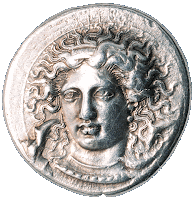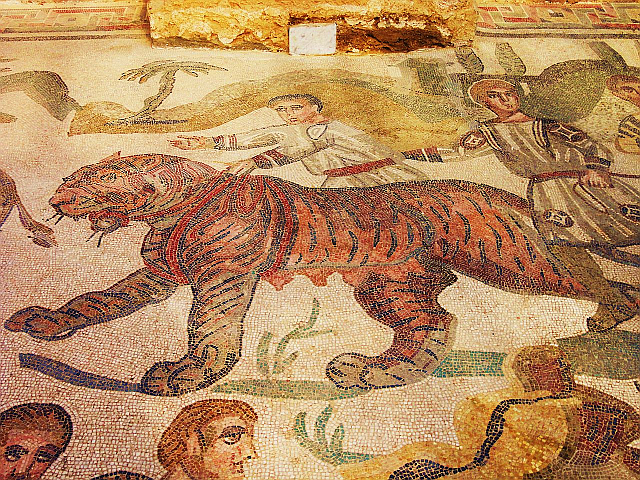The second stanza (the antistrophe) of the choral ode concluding Scene 5 of the Hippolytus is apparently sung by the women of Troezen. After the first strophe, with its vision of a world bereft of gods and of intelligibility (sung by Hippolytus's male friends), the women revert to the purely practical question of survival:
Χορός
εἴθε μοι εὐξαμένᾳ θεόθεν τάδε μοῖρα παράσχοι,
τύχαν μετ᾽ ὄλβου καὶ ἀκήρατον ἄλγεσι θυμόν.
1115δόξα δὲ μήτ᾽ ἀτρεκὴς μήτ᾽ αὖ παράσημος ἐνείη,
ῥᾴδια δ᾽ ἤθεα τὸν αὔριον μεταβαλλομένα χρόνον αἰεὶ
βίον συνευτυχοίην.
πολλὰ διδάσκει μ᾽ ὁ πολὺς βίοτος:
χρῆν γὰρ μετρίας εἰς ἀλλήλους
φιλίας θνητοὺς ἀνακίρνασθαι
255καὶ μὴ πρὸς ἄκρον μυελὸν ψυχῆς,
εὔλυτα δ᾽ εἶναι στέργηθρα φρενῶν
ἀπό τ᾽ ὤσασθαι καὶ ξυντεῖναι.
Her choice of metaphor can be compared with that of the women's chorus of Scene 5, which, to be clear, is speaking less of heart than of mind, of δόξα -- expectation, opinion -- but nonetheless is speaking of how to avoid sorrow. The mind should be pure -- ἀκήρατον -- a word used early in the play -- first by Hippolytus to describe the undefiled garden of Artemis which only he may enter, and later by Theseus to mock his son as someone who wore a mask of purity, of being virginal and "untouched by evil." (948)
Yet, to avoid tragedy, this chorus says, one should avoid being too proper. More precisely,
 The goal, says the chorus, is to be ῥᾴδια δ᾽ ἤθεα - easy going, flexible enough of disposition. A minted coin that is neither too exact nor too counterfeit. The metaphor is no longer the mixed drink, with its continuum of infinitesimal parts. One can always water down one's wine and join the Nurse in some choice attitude of moderation, but it's less simple to brandish a coin that is neither true coin of the realm nor counterfeit. Unlike water, coins are either true or false -- not infinitely subdividable, but binary.
The goal, says the chorus, is to be ῥᾴδια δ᾽ ἤθεα - easy going, flexible enough of disposition. A minted coin that is neither too exact nor too counterfeit. The metaphor is no longer the mixed drink, with its continuum of infinitesimal parts. One can always water down one's wine and join the Nurse in some choice attitude of moderation, but it's less simple to brandish a coin that is neither true coin of the realm nor counterfeit. Unlike water, coins are either true or false -- not infinitely subdividable, but binary.
The chorus aspires to the Nurse's mores of flexibility, but instead of the intimacy of the lovers' wine goblet, they sing of the representation of the royal treasury, the proper stamp of the realm. One could make the case that coins can be clipped or shaved so as to still be "true" in some compromised fashion. But much as Phaedra wondered how a wife could be false yet seem true, and just as her offspring would have been defiled if she were to seduce Hippolytus, so any effort to persuade representatives of the realm that clipped coins are still, sort of, maybe partly, true is not likely to win the day. (As William Chaloner learned in 1699 when he was hung for tampering with England's currency, when it came to counterfeiting, his prosecutor Isaac Newton, inventor of the calculus, found no "happy medium.")
The basic opposition here is between two analogues of heart and mind: the liquidity of the Nurse's vision of desire - not too strong, nor too weak, but certainly not reaching the marrow - and the impermeable solidity of both the coin and the stamp upon it. Coin and stamp are fixed, unable to be changed without losing that which makes them what they are. Where is the middle ground between a system of infinitesimal parts and another system of integral wholes?
There is one place in the play, though, where solid and liquid appear to be not two, but one:
Χορός
εἴθε μοι εὐξαμένᾳ θεόθεν τάδε μοῖρα παράσχοι,
τύχαν μετ᾽ ὄλβου καὶ ἀκήρατον ἄλγεσι θυμόν.
1115δόξα δὲ μήτ᾽ ἀτρεκὴς μήτ᾽ αὖ παράσημος ἐνείη,
ῥᾴδια δ᾽ ἤθεα τὸν αὔριον μεταβαλλομένα χρόνον αἰεὶ
βίον συνευτυχοίην.
ChorusThe thought is similar to the notion of "getting by" voiced by the Nurse earlier in the play:
O that in answer to my prayer fate might give me this gift from the gods, a lot of blessedness and a heart untouched by sorrow! [1115] No mind unswerving and obdurate would I have nor yet again one false-struck, but changing my pliant character ever for the morrow I would share the morrow's happiness my whole life through.
πολλὰ διδάσκει μ᾽ ὁ πολὺς βίοτος:
χρῆν γὰρ μετρίας εἰς ἀλλήλους
φιλίας θνητοὺς ἀνακίρνασθαι
255καὶ μὴ πρὸς ἄκρον μυελὸν ψυχῆς,
εὔλυτα δ᾽ εἶναι στέργηθρα φρενῶν
ἀπό τ᾽ ὤσασθαι καὶ ξυντεῖναι.
Nurse: My long life has taught me many lessons: mortals should not mix the cup of their affection to one another too strong, [255] and it should not sink to their very marrow, but the affection that binds their hearts should be easy to loosen, easy either to thrust from them or to bind tightly.The Nurse is speaking of love, but instead of έρος, she uses φιλίας, friendly affection, and στέργηθρα φρενῶν, fondness, love charms of the heart. She speaks of mortals as needing to temper the wine of powerful desire with water, to accomplish μετρίας -- moderation. And she speaks of not allowing affection to "sink to their very marrow," as if, rather than an intoxicating drink, love was a toxic poison.
Her choice of metaphor can be compared with that of the women's chorus of Scene 5, which, to be clear, is speaking less of heart than of mind, of δόξα -- expectation, opinion -- but nonetheless is speaking of how to avoid sorrow. The mind should be pure -- ἀκήρατον -- a word used early in the play -- first by Hippolytus to describe the undefiled garden of Artemis which only he may enter, and later by Theseus to mock his son as someone who wore a mask of purity, of being virginal and "untouched by evil." (948)
Yet, to avoid tragedy, this chorus says, one should avoid being too proper. More precisely,
μήτ᾽ ἀτρεκὴς μήτ᾽ αὖ παράσημος
neither too precise nor falsely stamped (i.e., counterfeit)
 The goal, says the chorus, is to be ῥᾴδια δ᾽ ἤθεα - easy going, flexible enough of disposition. A minted coin that is neither too exact nor too counterfeit. The metaphor is no longer the mixed drink, with its continuum of infinitesimal parts. One can always water down one's wine and join the Nurse in some choice attitude of moderation, but it's less simple to brandish a coin that is neither true coin of the realm nor counterfeit. Unlike water, coins are either true or false -- not infinitely subdividable, but binary.
The goal, says the chorus, is to be ῥᾴδια δ᾽ ἤθεα - easy going, flexible enough of disposition. A minted coin that is neither too exact nor too counterfeit. The metaphor is no longer the mixed drink, with its continuum of infinitesimal parts. One can always water down one's wine and join the Nurse in some choice attitude of moderation, but it's less simple to brandish a coin that is neither true coin of the realm nor counterfeit. Unlike water, coins are either true or false -- not infinitely subdividable, but binary.The chorus aspires to the Nurse's mores of flexibility, but instead of the intimacy of the lovers' wine goblet, they sing of the representation of the royal treasury, the proper stamp of the realm. One could make the case that coins can be clipped or shaved so as to still be "true" in some compromised fashion. But much as Phaedra wondered how a wife could be false yet seem true, and just as her offspring would have been defiled if she were to seduce Hippolytus, so any effort to persuade representatives of the realm that clipped coins are still, sort of, maybe partly, true is not likely to win the day. (As William Chaloner learned in 1699 when he was hung for tampering with England's currency, when it came to counterfeiting, his prosecutor Isaac Newton, inventor of the calculus, found no "happy medium.")
The basic opposition here is between two analogues of heart and mind: the liquidity of the Nurse's vision of desire - not too strong, nor too weak, but certainly not reaching the marrow - and the impermeable solidity of both the coin and the stamp upon it. Coin and stamp are fixed, unable to be changed without losing that which makes them what they are. Where is the middle ground between a system of infinitesimal parts and another system of integral wholes?
There is one place in the play, though, where solid and liquid appear to be not two, but one:
we saw, immense and uncanny,
a wave set fast in the sky


